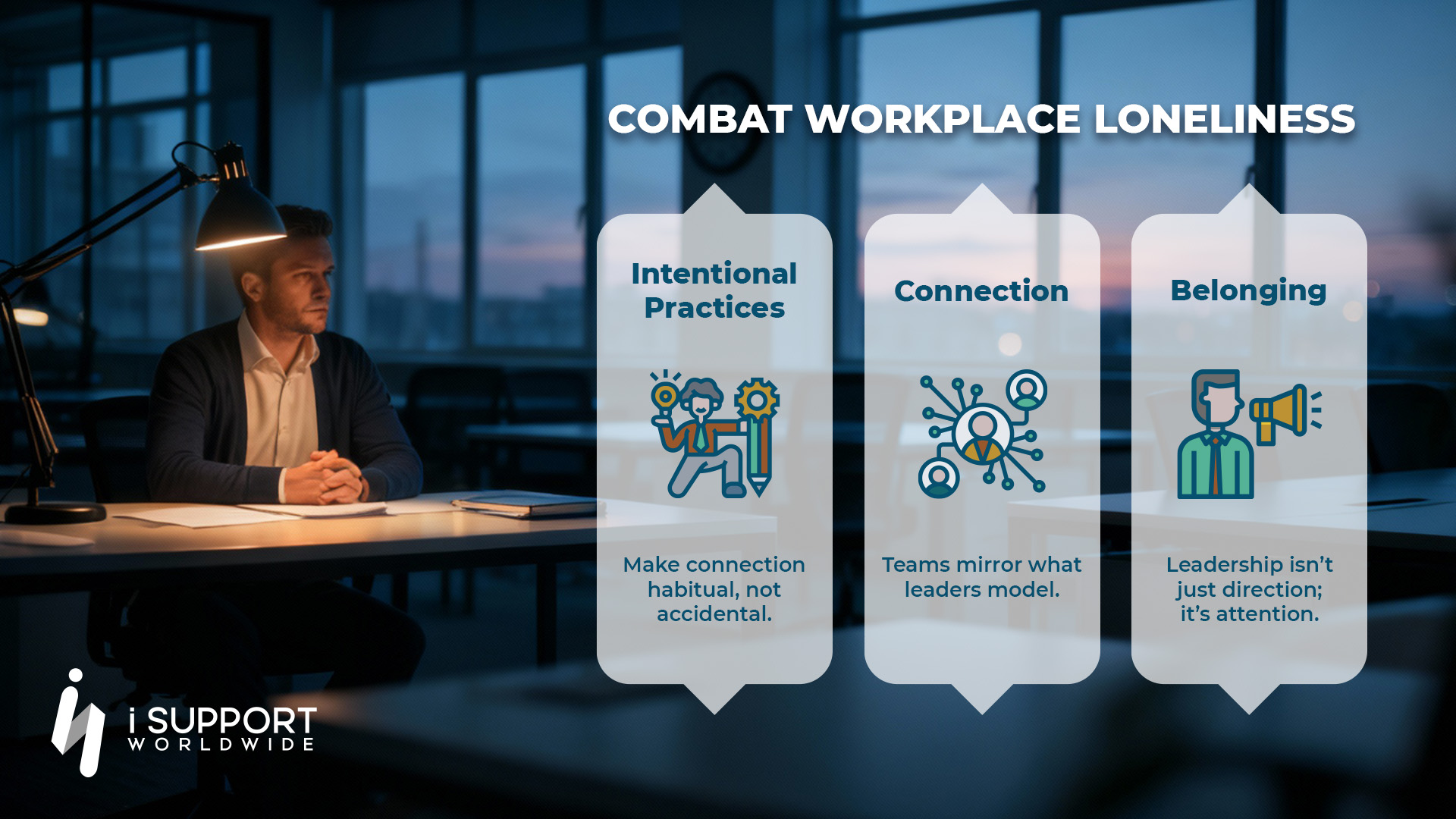
Key Takeaways
|
You might think you know your team. They show up to meetings, deliver on deadlines, and respond to your messages. Everything looks “fine.”
But what if they’re silently struggling?
Why We Shouldn’t Ignore Loneliness
Workplace loneliness has been called a “silent epidemic.” And for leaders, it comes with serious costs:
- Lower collaboration: Employees stop raising ideas or asking for help.
- Innovation stalls: Lonely employees won’t take risks or challenge assumptions.
- Engagement drops: They disengage, do the bare minimum, and mentally check out.
- Retention suffers: Disconnected employees are already looking for their next role.
“Loneliness has been linked to increased burnout, declining productivity, and rising attrition—costing U.S. companies up to $154 billion a year,” according to Harvard Business Review.
Here’s the kicker: your people might look active in meetings, but behind the scenes, they might feel unseen, unheard, or even unsupported.
And if you’re managing global or offshore teams, that disconnect is often even sharper.
This is a rare opportunity to define the technology future of a $40M+ and rapidly expanding organization. The ideal candidate is not just a technologist but a transformational leader who thrives in high-growth, high-impact environments and is driven to create measurable, lasting value.
Distance Doesn’t Have to Mean Disconnection
Nowhere is workplace loneliness felt more acutely than in global teams.
Offshoring is often sold as a cost-saving move. But too often, offshore employees are left on the fringe, treated as “outsourced help” rather than integral members of the team.
The result? Disconnected employees who feel invisible. And invisible employees eventually disengage, underperform, or leave.
If offshoring is done the wrong way, it doesn’t just magnify loneliness; it undermines the very value companies hope to gain.
Loneliness Doesn’t Check Your Map
While global teams often feel the pinch of distance, loneliness isn’t limited to employees across time zones.
Even team members sitting in the same office, or working hybrid locally, can feel invisible if connection isn’t intentionally nurtured.
According to Gallup, fully remote employees report significantly higher levels of loneliness (25%) compared to those working exclusively on-site (16%), while hybrid employees fall in between (21%). Even when teams are distributed or hybrid, connection can’t be assumed; it must be intentionally designed.
What Leaders Can Do Differently
Loneliness is not solved with perks, wellness stipends, or virtual trivia nights. Those are surface-level fixes. Leaders who are serious about solving this problem need to address it structurally by making a positive environment:
- Create intentional rituals. How does your team celebrate wins? Share ideas? Offer feedback?
- Model connection from the top. If you don’t make time to listen, neither will your managers.
- Redesign offshoring with belonging in mind. Because global teams don’t just want tasks; they want to be part of something bigger.

How We Do It at iSupport Worldwide
The future of work isn’t just limited to remote, hybrid, or global. The real future of work is connected.
We believe offshoring should never mean “out of sight, out of mind.”
We designed our approach around the core belief that employees do their best work when they feel comfortable, connected, and cared for.
Here’s what that looks like in practice:
- We listen first. Before placing talent, we conduct deep discovery into your business goals and employee needs—then align hiring, onboarding, and support systems to those insights.
- We move mountains for comfort. From ergonomic workspaces to 24/7 support to wellness programs, we ensure employees have everything they need to stay engaged and high-performing.
- We build communities, not commodities. Every employee is part of a broader culture program that connects them to peers, leaders, and the client’s vision—so they stay invested for the long term.
This is human-centered offshoring, where connection is the foundation, not an afterthought.
Closing Thought
Loneliness may be reshaping the workplace, but it doesn’t have to reshape yours.
With the right partner, you can scale globally without sacrificing human connection. You can grow your teams while ensuring every employee—no matter where they sit—feels valued, supported, and part of something meaningful.
Ready to build offshore teams that feel less like resources and more like family?
Email us at buildyourteam@isupportworldwide.com
About the Author Shekina P. Malonzo is a Licensed Professional Teacher and Content Developer at iSupport Worldwide, specializing in creating tailored content for the offshoring industry. |
Founded in 2006, iSupport Worldwide is a US-owned offshoring leader based in the Philippines, delivering tailored solutions to enhance operational efficiency and exceed client expectations. Recognized on the Inc. 5000 list of America’s fastest-growing private companies for three consecutive years, honored in Inc. Magazine’s Power Partner Awards, and a recipient of the ACES Award for Inspiring Workplaces in Asia, iSupport Worldwide embodies a commitment to excellence. |



